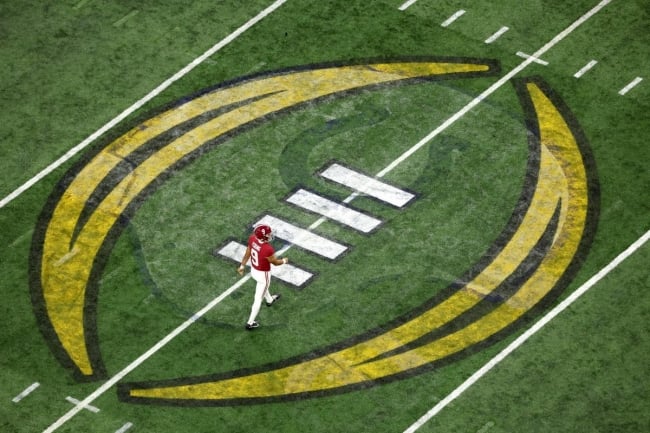You have /5 articles left.
Sign up for a free account or log in.

Alabama and Florida are rethinking laws passed prior to the NCAA introducing NIL guidelines.
Dylan Buell via Getty Images Sport
A number of forward-thinking states passed legislation in late 2020 and early 2021 to establish laws governing how NCAA athletes could profit off of their names, images and likenesses. Now some states are rethinking those laws after the NCAA ultimately put forth a bare-bones NIL policy last summer.
That means states that were ahead of the game now have more restrictions than others that never passed NIL legislation. Suddenly they are considering fresh legislation so they don’t fall behind on NIL and get passed over by recruits who choose more NIL-friendly territory.
“In my mind, there’s really not any benefit to having a state NIL law right now,” said Mit Winter, a collegiate sports attorney at Kennyhertz Perry, a law firm in Kansas City, Mo.
Rethinking Recent Legislation
College athletes signing sponsorship deals was once unthinkable, but now it’s big business. And as the dust settles from the shake-up of college athletics, states are looking to repeal or amend laws that put them at a disadvantage. College recruiting is at the heart of this strategic reset.
“Some states, like Alabama, which is considering repealing its law, and Florida, which is considering amending its law, are rolling back because the premise for passing that legislation is gone with the NCAA changing its position,” said Darren Heitner, an attorney who teaches sports law at the University of Florida law school and who worked with state representative Chip LaMarca to draft Florida’s NIL legislation, which went into effect in July. “Now states that were proactive and led the charge are at a potential disadvantage because their restrictions are heavier than those that have been implemented by the NCAA. States that don’t have any laws have a potential advantage.”
Florida was one of the early adopters of NIL laws, but now LaMarca is rethinking the legislation he introduced. He wants to update it to drop a clause that bars universities and athletic departments from facilitating deals, a clause that Heitner says many expected the NCAA to have in its bylaws. But NCAA guidelines don’t prohibit such arrangements, meaning Florida’s law is unnecessarily strict by comparison.
LaMarca did not respond to a request for comment but did address his proposed amendment in an interview with the Orlando Sentinel: “The ultimate goal of the bill is very similar to what we wanted to do in the original bill, and that’s to allow students to be fully involved in the free market within the parameters of their contract with the university while offering them a level playing field.”
“Behind the push to repeal or amend some state laws is the issue of facilitation of NIL deals—whether universities can facilitate deals for their athletes themselves,” Winter explained. “A lot of state laws say that universities can’t facilitate deals for the athletes or use the language ‘cannot cause compensation to be directed to their athletes,’ basically the same thing as facilitation.”
One example of such a deal, which made national headlines, is Brigham Young University’s partnership with an energy bar company to provide scholarships to walk-on athletes as part of an NIL deal. Under current laws, such a partnership would not be feasible in Florida and other states.
Alabama aims to go further than Florida and repeal its NIL law outright.
“It’s just a straight repeal of what we did last year,” Representative Kyle South told Alabama Daily News in January. “We were thinking that the NCAA last year was going to go in one direction and they ended up adopting basically a different rule that was kind of a blanket for everybody.”
South—who did not respond to an interview request—authored Alabama’s NIL legislation; this year he’s leading the charge to repeal it, as the rules of the game have changed regarding NIL.
And states without current NIL legislation that are moving to pass such laws—Kentucky and Virginia, for example—are omitting language that would bar colleges from facilitating deals for athletes.
Florida and Alabama are the two most prominent examples of states changing NIL laws, but colleges are also amending policies to strengthen their position in recruiting. Ohio State University, for example, updated its NIL guidelines in January to allow for the creation of an advisory group with the intent of assisting Buckeyes athletes in the facilitation of NIL agreements.
“Our guidelines were initially created to be restrictive, but now that we have a better understanding of NIL, it’s clear that we can provide more assistance in connecting student athletes with interested brands,” Ohio State senior associate athletic director Carey Hoyt said at the time of the announcement. “By allowing some OSU staff to interact with the brands and to educate and answer questions, we can eliminate hesitancy from brands, and donors, who were concerned about breaking rules.”
Winter points to Ohio State as an example that other colleges are likely to follow, reworking their own internal policies to help facilitate NIL deals to avoid falling behind in a recruiting arms race.
Inaction at the Federal Level
Given the bare-bones policies of the NCAA and the patchwork of state laws governing NIL, there’s no clear standard across the nation. And experts don’t expect Congress to establish one in the near future.
“There have been many [NIL] hearings on Capitol Hill, in various subcommittees, mostly with individuals in Congress wanting to hear themselves speak or talk about their time when they were in college,” Heitner said. “It’s a bunch of nonsense, if you ask me.”
Winter suspects that a clean NIL bill—one not bogged down with additional measures tacked on—would likely win approval in Congress. He just doesn’t expect to see it anytime soon.
“A lot of people at universities and the NCAA would love to have a federal law, so it’s standard amongst all the states and schools and there’s some sort of enforcement mechanism, which there really isn’t right now,” Winter said. “But I’m not optimistic that anything at the federal level will happen anytime soon. The federal government has so many other priorities right now.”




